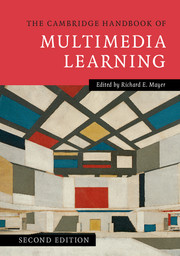Book contents
- The Cambridge Handbook of Multimedia Learning
- The Cambridge Handbook of Multimedia Learning
- Copyright page
- Contents
- Contributors
- Preface
- Acknowledgments
- 1 Introduction to Multimedia Learning
- Part I Theoretical Foundations
- Part II Basic Principles of Multimedia Learning
- Part III Advanced Principles of Multimedia Learning
- Part IV Multimedia Learning of Cognitive Processes
- Part V Multimedia Learning in Advanced Computer-Based Contexts
- Author Index
- Subject Index
1 - Introduction to Multimedia Learning
Published online by Cambridge University Press: 05 August 2014
- The Cambridge Handbook of Multimedia Learning
- The Cambridge Handbook of Multimedia Learning
- Copyright page
- Contents
- Contributors
- Preface
- Acknowledgments
- 1 Introduction to Multimedia Learning
- Part I Theoretical Foundations
- Part II Basic Principles of Multimedia Learning
- Part III Advanced Principles of Multimedia Learning
- Part IV Multimedia Learning of Cognitive Processes
- Part V Multimedia Learning in Advanced Computer-Based Contexts
- Author Index
- Subject Index
Summary
Multimedia learning is learning from words and pictures. The rationale for studying multimedia learning is that people can learn more deeply from words and pictures than from words alone. A goal of research on multimedia learning is to understand how to design multimedia learning environments that promote meaningful learning. The research base concerning multimedia learning is reflected in the 34 chapters of this handbook. What is new in this second edition is a sharp increase in the research base, the addition of seven new principles of multimedia learning, a broadening of contexts for studying multimedia learning, a better delineation of boundary conditions for principles, and refinements of theories of multimedia learning. The approach taken in this handbook is learner-centered rather than technology-centered, views learning as a constructive process rather than solely as a process of adding new information to memory or strengthening associations, seeks to foster meaningful learning rather than rote learning, and favors appropriate cognitive activity during learning rather than behavioral activity per se.
- Type
- Chapter
- Information
- The Cambridge Handbook of Multimedia Learning , pp. 1 - 24Publisher: Cambridge University PressPrint publication year: 2014
- 89
- Cited by

